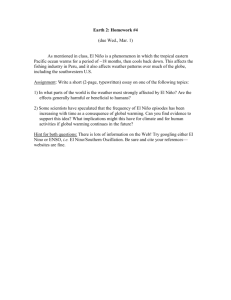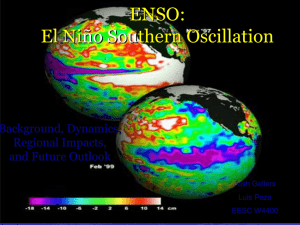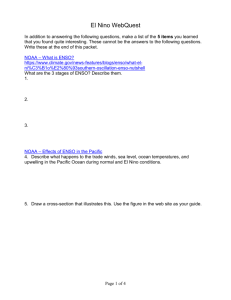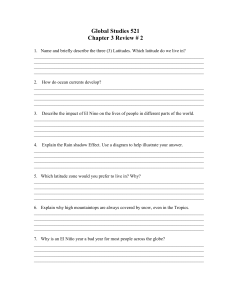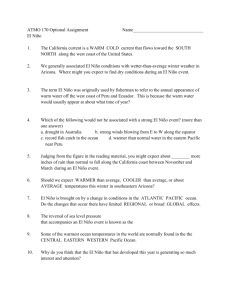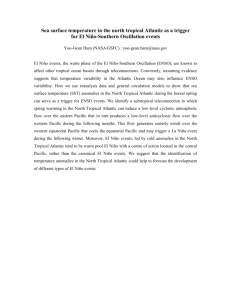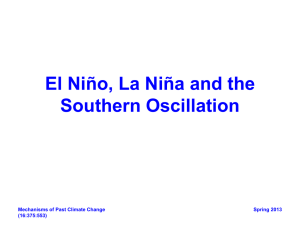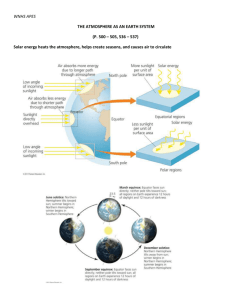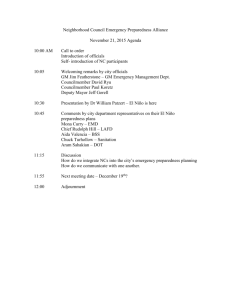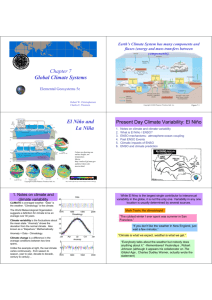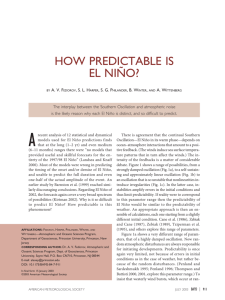Anthrop H597.03 Sample Syllabus
advertisement
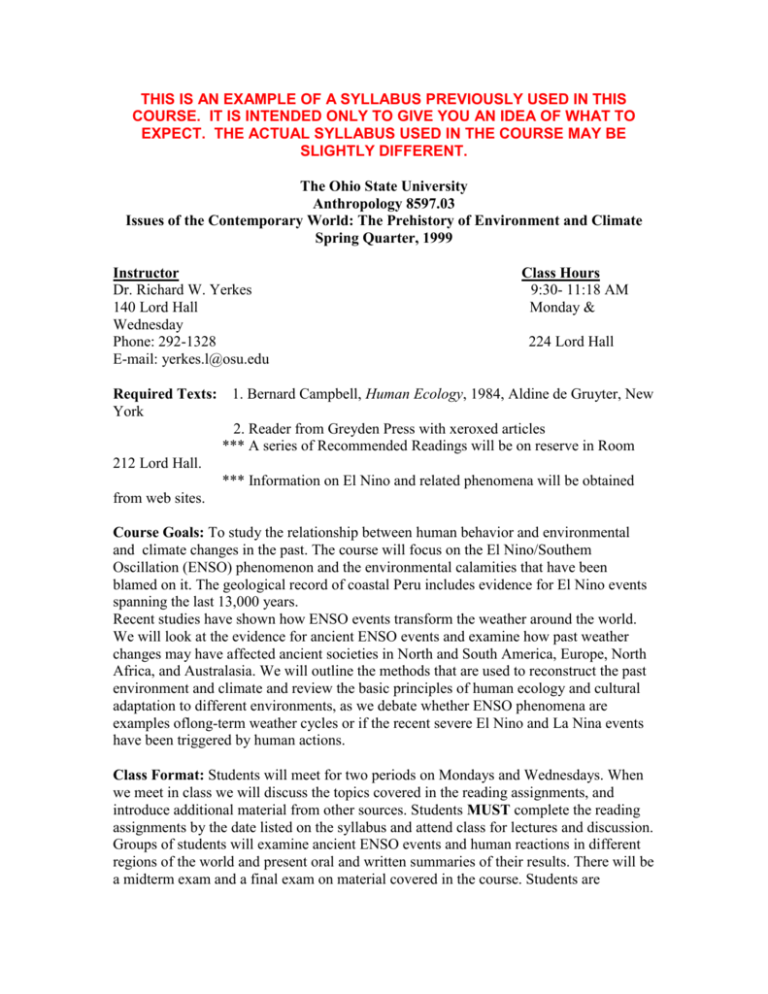
THIS IS AN EXAMPLE OF A SYLLABUS PREVIOUSLY USED IN THIS COURSE. IT IS INTENDED ONLY TO GIVE YOU AN IDEA OF WHAT TO EXPECT. THE ACTUAL SYLLABUS USED IN THE COURSE MAY BE SLIGHTLY DIFFERENT. The Ohio State University Anthropology 8597.03 Issues of the Contemporary World: The Prehistory of Environment and Climate Spring Quarter, 1999 Instructor Dr. Richard W. Yerkes 140 Lord Hall Wednesday Phone: 292-1328 E-mail: yerkes.l@osu.edu Class Hours 9:30- 11:18 AM Monday & 224 Lord Hall Required Texts: 1. Bernard Campbell, Human Ecology, 1984, Aldine de Gruyter, New York 2. Reader from Greyden Press with xeroxed articles *** A series of Recommended Readings will be on reserve in Room 212 Lord Hall. *** Information on El Nino and related phenomena will be obtained from web sites. Course Goals: To study the relationship between human behavior and environmental and climate changes in the past. The course will focus on the El Nino/Southem Oscillation (ENSO) phenomenon and the environmental calamities that have been blamed on it. The geological record of coastal Peru includes evidence for El Nino events spanning the last 13,000 years. Recent studies have shown how ENSO events transform the weather around the world. We will look at the evidence for ancient ENSO events and examine how past weather changes may have affected ancient societies in North and South America, Europe, North Africa, and Australasia. We will outline the methods that are used to reconstruct the past environment and climate and review the basic principles of human ecology and cultural adaptation to different environments, as we debate whether ENSO phenomena are examples oflong-term weather cycles or if the recent severe El Nino and La Nina events have been triggered by human actions. Class Format: Students will meet for two periods on Mondays and Wednesdays. When we meet in class we will discuss the topics covered in the reading assignments, and introduce additional material from other sources. Students MUST complete the reading assignments by the date listed on the syllabus and attend class for lectures and discussion. Groups of students will examine ancient ENSO events and human reactions in different regions of the world and present oral and written summaries of their results. There will be a midterm exam and a final exam on material covered in the course. Students are encouraged to draw on what they have learned in other classes (or in their own research experiences) during the discussion periods. Grading: The final grade will be based on: Midterm exam: Final exam: Class Projects: Class Attendance and Participation: TOTAL: 100 points 100 points 150 points 30 points 380 points COURSE OUTLINE DATE TOPIC AND READING ASSIGNMENTS 29 March Introduction, form teams for group projects. 31 March Ecological Perspectives, Read Preface and Introduction in Human Ecology, pp. vii to 17; and Chapter 1 in the Reader (M. Harris: Ecology and Ecosystems). 5 April Tropical and Temperate Ecosystems, Read Chapters 2,3,4, and 5 in Human Ecology, pp. 18-93. Hunter-Gatherers, Herders, and Farmers, Read Chapters 7,8, and 9 in Human Ecology, pp. 94-167. 7 April 12 April 14 April First Exercise: Select one of the types of ecosystems that we have discussed (Tropical Rain Forest, Tropical Savanna, Temperate Forest, Northern Grassland or Forest), and describe how a group ofhunter-gatherers, a group of herders, and a group of farmers would be affected by severe flooding or by severe drought. Which group would suffer the most as a result of the calamity? Why? (15 points) Changing Human Ecosystems, Read Chapters 10 and 11 in Human Ecology, pp. 168-196; and Chapter 2 in the Reader (1. Moody: The Cretan Environment). Understanding and Reconstructing Past Climates, Read Chapters 3 and 4 in the Reader (W.J. Burroughs: Proxy Data, and The Global Climate). 19 April 21 April Understanding and Reconstructing Past Climates, continued. What is El Niño? ALL READ: National Geographic Vol. 195, #3 (March, 1999): El Nino/LaNina: Nature's Vicious Cycle: pp. 72-95. Second Execise: Prepare a brief, written definition of the El Niño/La Niña/ Southern Oscillation (ENSO) phenomenon. You will also be asked to present an oral summary of your definition in class. Provide a list of the sources for the information that you used to prepare your summary and definition (books, articles, web sites, etc.). Use the citation format on the style sheet (20 points) 26 April What have you heard about El Niño? Third Exercise: Bring an article to class about the recent effects of the El Niño/La Niña/Southern Oscillation (ENSO) phenomenon that you found in a magazine or newspaper. Present an oral summary of the article and critique it for the class. Is it accurate? What were the sources used in the article? (15 points) 28 April 3 May MIDTERM EXAM in class El Niño and Ice-Cores, Read Chapters 5 and 6 in the Reader (Thompson et al. : Reconstructing interannual climate variability; and, Glacial records of global climate), Also read the following article on reserve in 212 Lord Hall: (1). Thompson, L.G. (1996) Climatic changes for the 2000 years inferred from ice-core evidence in tropical ice cores. In: Climatic Variations and Forcing mechanisms of the last 2,000, edited by D. Jones, R. Bradley and J. Jouzel, NATO Advanced Research Series I, Volume 41, pp. 281-295. May 5 10 May 12 May El Niño and Ice-Cores, continued. El Niño, History , and Prehistory , , Read Chapters 7 and 8 in the Reader (D. B. Enfield: Historical and prehistorical overview of El Niño/Southern Oscillation; and W. H. Quinn: A study of Southern Oscillation-related climatic activity for A.D. 622-1900 incorporating Nile River flood data), El Niño and Archaeology Read the following articles on reserve in 212 Lord Hall: (2). Paulsen, Allison (1986) Climate change and the rise of the state in prehistoric Peru. Paper read at the 85th Annual Meeting of the American Anthropological Association, Philadelphia. (3). Sandweiss, Daniel (1999) El Niño and the Archaeological Record in Northern Peru. SAA Bulletin 17(1): 9-11. 17 May Oral Presentations of Group Projects 19 May Oral Presentations of Group Projects 24 May Oral Presentations of Group Projects 26 May Oral Presentations of Group Projects 31 May Memorial Day: NO CLASS 2 June SENIOR FINAL EXAM Summary and Review 7 June MONDAY: FINAL EXAM 9:30 AM in class written summary of group project due in my office, 140 Lord Hall, by 4:00 PM THIS MATERIAL IS AVAILABLE IN ALTERNATIVE FORMATS UPON REQUEST. PLEASE CONTACT THE DEPARTMENT OF ANTHROPOLOGY, 292-4149, FOR FURTHER INFORMATION. STUDENTS WITH DISABILITIES ARE RESPONSIBLE FOR MAKING THEIR NEEDS KNOWN TO THE INSTRUCTOR, AND ARE RESPONSIBLE FOR SEEKING AVAILABLE ASSISTANCE AS SOON AS POSSIBLE, AND CERTAINLY PRIOR TO THE FIRST EXAMINATION . .
